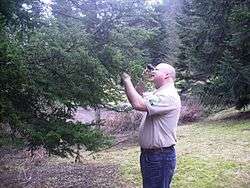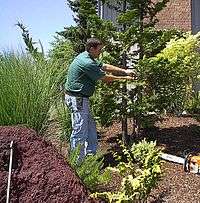Certified Arborist


The Certified Arborist credential identifies professional arborists who have a minimum of three years' full-time experience working in the professional tree care industry and who have passed an extensive examination covering all facets of arboriculture. The Western Chapter of the International Society of Arboriculture (ISA) started the certification program in the 1980s. As the program proved its worth, it was taken over and expanded by the parent ISA organization. More recently, the ISA added specialty certifications of Utility Specialist, for those maintaining vegetation around electric utility wires, Municipal Specialist, for those with additional experience managing public urban trees, and the Board Certified Master Arborist, for those with extensive knowledge that comes with higher levels of education and experience.
Requirements
The Certified Arborist examination has 200 questions on tree biology, tree identification and selection, tree-soil-water relations, tree nutrition and fertilization, tree planting and establishment, pruning concepts and techniques, cabling, bracing and lightning protection, problem diagnosis and management, tree preservation on construction sites, climbing and safe work practices, and tree risk assessment. Certification is valid for three years, during which time the arborist must complete 30 continuing education units (CEUs) in order to re certify. Certified Arborists earn CEUs by attending seminars, studying in college courses, or completing study in ISA published magazines and books. A study guide outlines the basic knowledge tested on the exam. To qualify as a candidate to write the exam, an individual must have a minimum of three years verifiable experience in various aspects of tree care.
Benefits
The arborist certification program has successfully improved the profession by setting minimum standards of achievement, incentives for continuing education, and an improved image from both the arborist and the general public points of view. The language used in arboriculture has become more scientific and educated, and less dependent on vague and ambiguous words like lacing and rounding-over. The more descriptive language Certified Arborists use gives purchasers of tree service a high degree of assurance that their trees will not be damaged or mutilated, and that both they and the arborist understand the effects of a particular treatment.
Tree Worker Certification
Both the Western Chapter and the ISA also have Tree Worker certifications. The academic part of the Tree Worker exam covers some tree science and identification, but mostly focuses on the practical aspects of climbing and working in trees. The second part of the exam is an actual demonstration of the Tree Worker's climbing and safety skills. The applicant must also have aerial rescue training and a valid certification for first aid and CPR.
Status
An ISA "Certified Arborist" may not be equivalent to an "Arborist" who is "Certified". Several colleges like Portland Community College of Oregon, offer Certificates in Landscape Technology, through courses which include arboriculture, tree identification and other horticulture classes. A student from one of these colleges may function in business with the title "Arborist", and possess the related but different certificate or qualification. In which case they would be an "Arborist with a certificate of qualification". But the ISA certification uses the specific nomenclature "Certified Arborist". Also, the ISA Certification is not a "Degree" in Arboriculture; it is a certification that can be maintained and renewed.
Most college certificates are based on education and testing only, and are permanent. The ISA Certification includes "experience" with testing, and requires continuing education for renewal. It should also be noted that the general way to distinguish a certification from a certificate or a qualification is certifications in arboriculture will expire, and will need to be renewed on a regular and ongoing basis. Part of this renewal process will always include keeping education up to date. The certificates or qualifications provided by colleges typically do not expire nor do they require any further ongoing education to remain valid.
While the Certified Arborist is the minimum one should consider as a potential candidate to hire, there are also Board Certified Master Arborists and Registered Consulting Arborists who are elite specialists in the arboriculture field.
The Board Certified Master Arborist is the highest level of certification offered by ISA. This credential recognizes ISA Certified Arborists® who have reached the pinnacle of their profession. In addition to passing an extensive scenario-based exam, the typical Master Arborist will have ten or more years of field experience.
The Registered Consulting Arborist are the pre-eminent authorities on matters related to trees—ensuring the safety, health, and preservation of trees in our natural surroundings. Both homeowners and industry professionals will find a number of different reasons to hire a Consulting Arborist to achieve their objectives.
From a consumer standpoint one should distinguish between the college "Arborist with a certificate of qualification" which many advertise as a Certified Arborist, and that of an ISA Certified Arborist. While both are trained in arboriculture, in theory at least the ISA Certified Arborist should be the better or more knowledgeable of the two as they initially do have to prove experience to write the exam, and must have an ongoing education in arboriculture to maintain that status of Certified Arborist.
The ISA Certified Arborist is the minimum the consumer should look for in tree service, with preference going towards the Board Certified Master Arborist or Registered Consulting Arborist if available.
The Certified Arborist Training School (CATS), is a program that oversees continuing education which progresses tree service professionals toward their ISA Arborist Certification.
External links
- http://www.isa-arbor.com/ International Society of Arboriculture
- http://www.treesaregood.org/ TreesAreGood.org (arboricultural resources for the general public)
- http://www.isa-arbor.com/certification/verifyCredential/index.aspx Verify a Certified Arborist credential
- http://www.asca-consultants.org/ American Society of Consulting Arborists
- http://www.certarb.com/ Certified Arborist Training School
- The RCA designation is provided by the American Society of Consulting Arborists